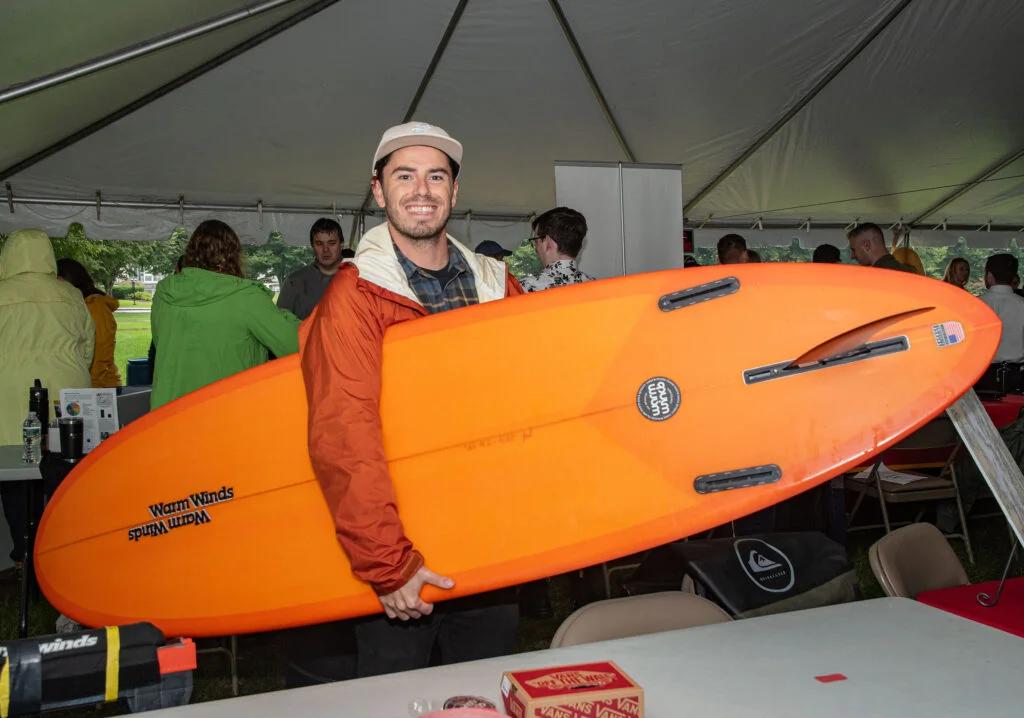As the flagship institution of the Ocean State, the University of Rhode Island is no stranger to collaborating with the many industries that conduct activities on our state’s coastlines and waters.
On Sept. 29, some of these industries got to interact with over 300 URI students in attendance at the first annual Sea Services Symposium, an event held in conjunction with URI’s Department of Marine Affairs and the University’s Military and Veteran Education Center.
The event featured over 40 exhibits, with over a third of booths representing maritime career opportunities that students can reach through URI programs, such as the Marine Biology and Ocean Engineering departments, the Graduate School of Oceanography and maritime operations aboard the research vessel “RV Endeavor”, which is based at the Narragansett Bay Campus.
Many booths at the symposium highlighted opportunities in ‘sea services’ as well, with one such booth representing the National Oceanic Atmospheric Association, which is housed inside the U.S. Department of Commerce.
The organization gathers data on climate change, fisheries research, atmospheric research and hydrography. Additionally, NOAA has a division in Lakeland, Florida known as the ‘Hurricane Hunters’ who help fly planes near hurricane sites in order to gather valuable GPS and meteorological data.
One interesting fact about NOAA: if you were to look up any chart or map of American waters, such as a map of the Rhode Island coastline, it is most likely created by their officers using data they’ve collected, according to Lieutenant Andy Fullerton, Operations Officer on the NOAA ship ‘Henry Bigelow’.
“We drive ships or we fly planes, and we manage a lot of the operational frontline efforts to gather data to inform policy decisions and also to inform economic decisions in the United States,” Fullerton said.
While NOAA is primarily concerned with ocean affairs, those in a STEM field not related to marine sciences can still work for the organization, according to Cherisa Friedlander, NOAA Lieutenant Commander and marine advisor.
“All of the coursework that you’re exposed to throughout programs here at URI sets you up for success for any uniform service, but especially for NOAA because we’re a science oriented uniform service,” Freidlander said. “All of the work that we do, whether it’s flying aircraft or sailing the research vessels, and all of the coursework and scientific work that you’re doing while you’re in your undergrad, or maybe even graduate degree, is going to be directly relevant for the kind of work that we’re also trying to do.”
Friedlander went on to connect her own marine biology background as an undergraduate at URI to her time serving in NOAA, and how it was a great fit for both her career and interests.
“I’ve been in the Corps now for 12 years, and the opportunities that I’ve gotten throughout the NOAA Corps have allowed me to stay connected to science and research — specifically with fisheries, which has been a really nice career track for me,” Friedlander said.
Impressions from students in non-marine majors who attended the event were very positive. Zoie Ndonye, a second-year animal science major, said at first she wasn’t sure there would be much benefit attending as a non marine-science major, but hearing from the different exhibitors in attendance quickly changed her mind.
“Now that I’ve gone through the exhibits, I’ve seen a lot of different things that I could definitely benefit from in my career path,” Ndonye said. “I’m glad I came to stop by and see that.”





